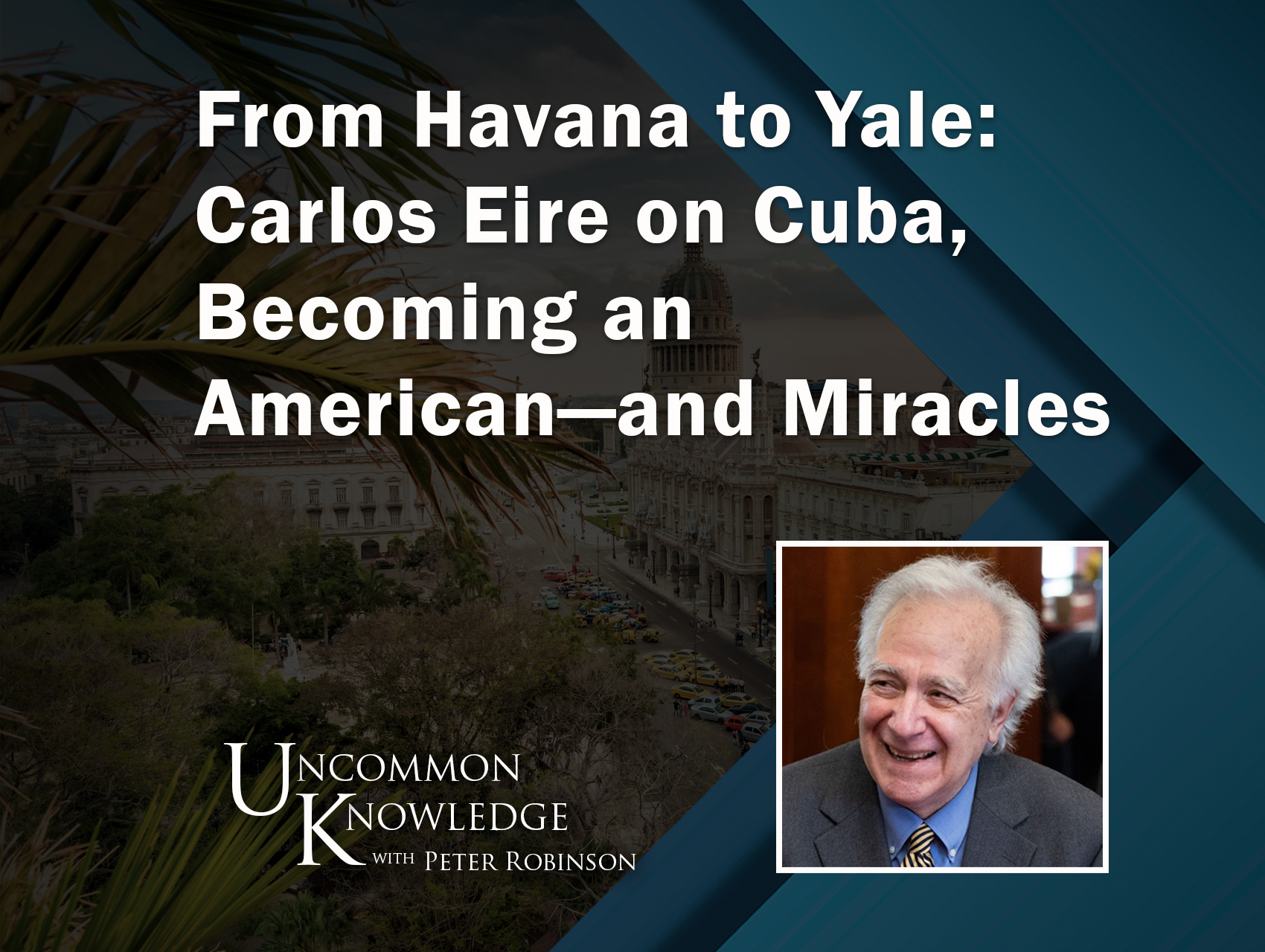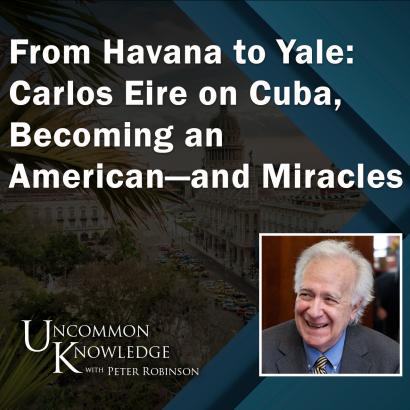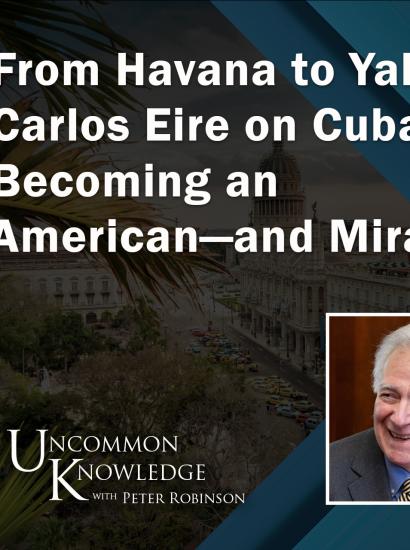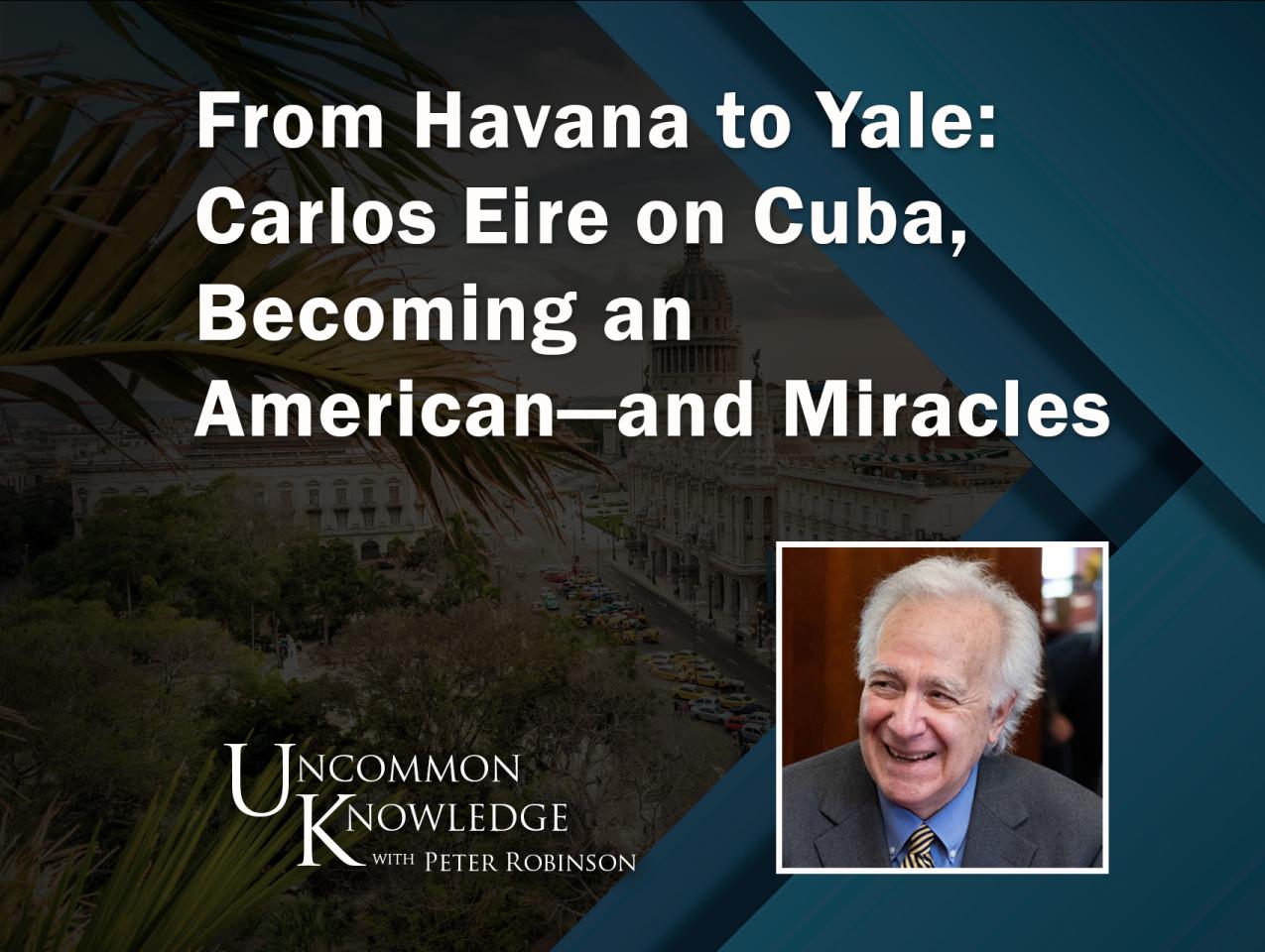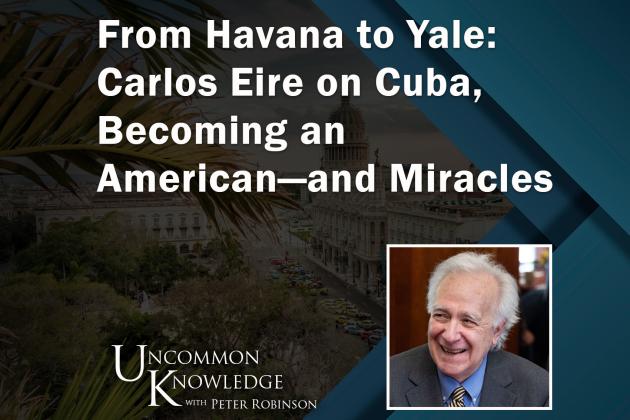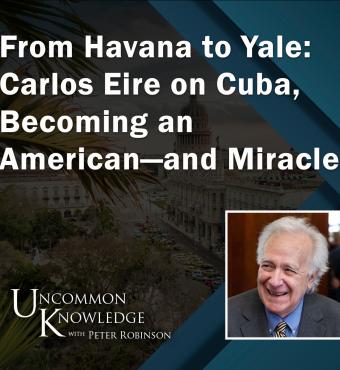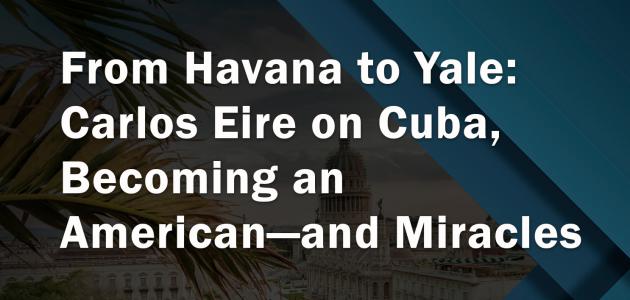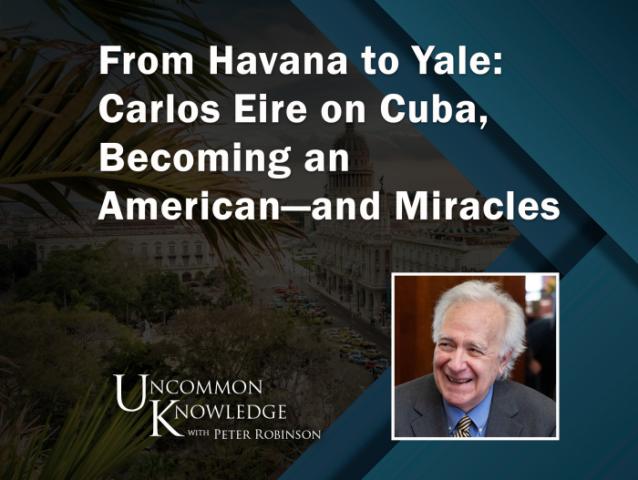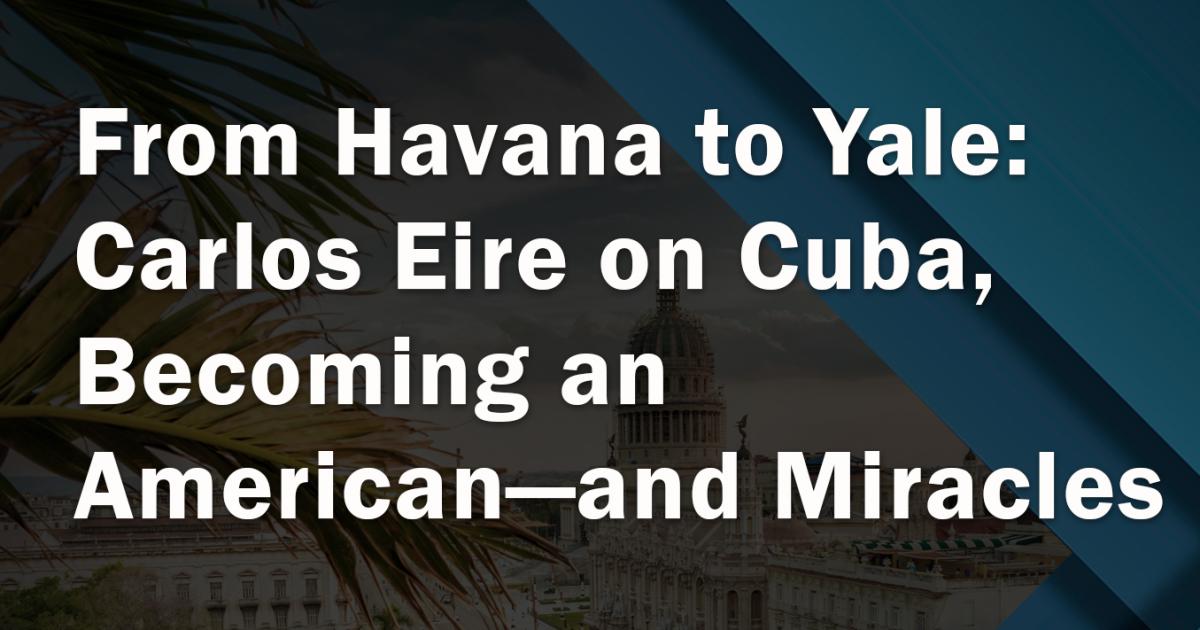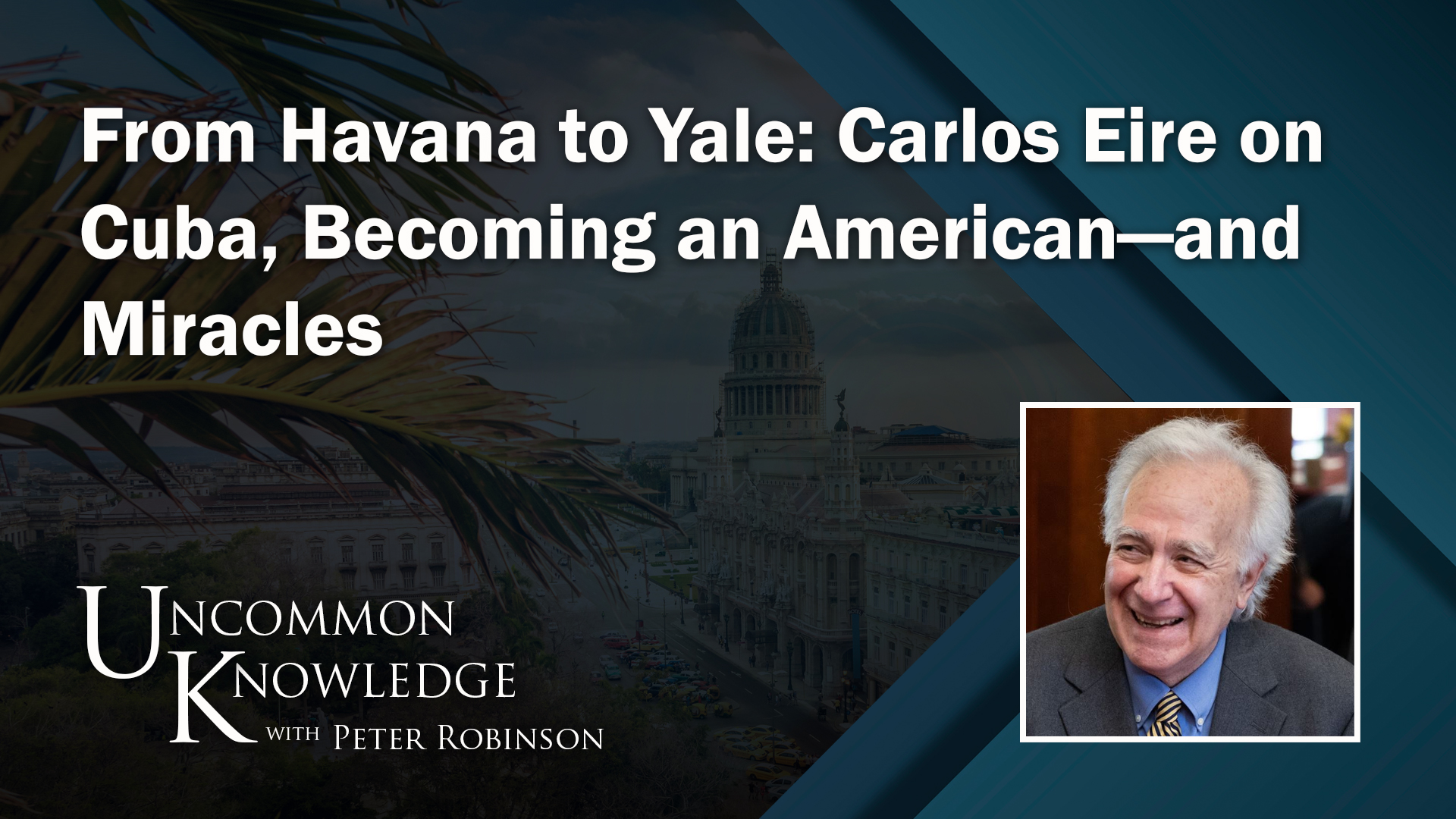- Politics, Institutions, and Public Opinion
- Comparative Politics
- World
- Politics, Institutions, and Public Opinion
- Determining America's Role in the World
- Revitalizing History
Yale historian and memoirist Carlos Eire recounts his extraordinary journey from being an 11-year-old Cuban boy in Operation Peter Pan—sent to the United States to escape Fidel Castro’s regime—to becoming a National Book Award–winning author and chaired professor at Yale. Eire discusses the painful separation from his family, the challenges of assimilation, and the lifelong tension between his Cuban and American identities, themes he explores in his acclaimed memoirs Waiting for Snow in Havana and Learning to Die in Miami.
The conversation also delves into Eire’s recent book They Flew: A History of the Impossible, which examines early modern testimonies of levitation, bilocation, and miracles, and how belief, culture, and skepticism shaped their reception. Eire also reflects on Cuban history, the failures of the Castro regime, the broader Hispanic experience in America, and the enduring clash between materialist skepticism and openness to mystery.
Recorded on September 8, 2025.
- In 1962, a bewildered little Cuban boy was sent to the United States by his parents to escape communism. Today, that little boy is an esteemed historian, a chaired professor at Yale, and a bestselling author Carlos Eire, on Uncommon Knowledge. Now, welcome to Uncommon Knowledge recording today at Yale University. I'm Peter Robinson. Born in Havana. Carlos Eire moved to this country at age 11 as part of Operation Peter Pan, the program under which some 14,000 Cuban children were sent to the United States by their parents. Between 1960 and 1962 to escape the communist regime of Fidel Castro, professor er lived in a succession of temporary homes before settling in Chicago, putting himself through school as a supermarket stock boy and a hotel dishwasher. Professor er earned his undergraduate degree at Loyola University in Chicago, then earned his doctorate here at Yale for almost 30 years. Now, professor er has taught here at Yale where he's now the T Larson Riggs Professor of History and Religious Studies. Professor er is the author of More than Half a Dozen works of history and two volumes of memoirs, including this first volume of his memoirs waiting for Snow in Havana and his second volume Learning to Die in Miami. Carlos here, thank you for joining us. Oh,
- Thank you for inviting
- Me. I may as well just say it full disclosure to our viewers. I'm married to a Cuban. Your books have been read by every member of her family, all our children. It's mandatory reading in our household. As I've just mentioned, you've composed more than half a dozen works of medieval and modern history, and two volumes of memoirs. These books have attracted prize after prize. Here we have on this edition, national Book Award winner. And yet there is this on your biography on the Yale website, quote, all of his books are banned in Cuba where he has been proclaimed an enemy of the state. A distinction he regards as the highest honor of all.
- Yes.
- Explain yourself.
- Well, it's the highest honor because it means that I, I'm opposed to one of the worst dictatorships on Earth, but it's also the easiest honor to earn because all you have to do is speak out and to get attention when you speak out. And because this book won the National Book Award and I said some unkind things about Cuman government at my acceptance speech,
- There is no freedom to write. There is no freedom to read. Everything that the National Book Foundation stands for is negated in Cuba on a daily basis.
- That's when I, I see. Became an item on their list.
- We'll, we'll come to Cuba again in a moment, but have you been back?
- No, I can't go
- Back. You can't go back. This is what I,
- I learned I was an enemy of the state in official enemy. 'cause the US State Department contacted me and said, don't you dare fat foot over there. They'll, you know, they'll nab you. Alright.
- This is gonna be frustrating for me because I wanna put all of you into one conversation. We'll come to your works of religious history, particularly your recent work they flew. But first, the story, your life story leaving Cuba for the United States then and now. Then Fidel Castro consolidates power in Cuba in the revolution of 1950 nines, three years later, your parents put you and your brother on an airplane bound for Miami. It would be three more years before you saw your mother and you would never see your father again. He died in Havana in 1976. Now, today, the last surviving member of the founding generation of communist Cuba, Raul Castro, Fidel's younger brother is 94, and a senior at Yale University, was born a dozen years after the Cold War ended. A question about historical memory. How, how do you make your students understand? How do you convey that there was once a world in which it made sense for parents to send their children away?
- It's, it's not very difficult. Is that's all really. Yeah. Because of one item on the list of, you know, the things that parents were worried about is that while the airlift was in operation Cuban children were being sent to the Soviet Union and Eastern Europe. And there were many grandparents in Cuba of Spanish origin, Spanish immigrants, like my grandparents, who remembered what had happened in Spain during the Civil War in the 1930s when Spanish children were sent to the Soviet Union. And most of them never came back again. Right. So my parents and the parents of every other Peter Pan Cat would have, would have said to their children, explaining what's happening. We don't want you to end up in Russia or Czechoslovakia or East Germany. So, and
- Did you understand at the age of 11, oh
- You did? Oh yeah, I did. I wanted to get out. But of course, children have no ability to reconcile conflicting emotions. So part of me was delighted to leave, even though I was leaving my parents behind. And part of me was terrified. Of course, I thought I would see them again. I thought I would only be in the US for a few months. I
- I see. The the original idea was that they would recall you when things settled down.
- Yes. Yeah. I see that, you know, the dictatorship would collapse and we would go back. That's what almost every Peter Pan had in mind.
- Right.
- The other alternative, which was considered very, very, very real and very possible was for our parents to join us here. I see. But some fathers, including mine, were not given permission to leave. There were tens of thousands of families that were intentionally separated because the father would not be given permission to leave.
- Carlos, may I, I'm going to quote from waiting for snow in Havana. Havana was not in the United States. That was the beauty of it. And the horror. There's that split that you're talking about. Yes. That divide for the poor, the poor of Cuba opportunity knocked loudest in the lottery, in the numbers racket. For anyone who wasn't poor life could be beautiful. Now, it feels to me as the popular culture in this country conveys the notion of the poverty and corruption of pre Castro Q All you have to do is look at Godfather two.
- Yes.
- Right. It it's there, it's out there. But the notion that Cuba, that there were some people for whom c life in Cuba could be beautiful. Could you expand on that?
- Yes. And it wasn't just a few people. Cuba had an enormous middle class, one of the largest and Latin America. And it had a very prosperous economy. And that's what many Americans don't realize. But the poor were poor, and especially in the countryside. And I never set foot in the countryside very often. So all I knew was urban poverty. And there was urban poverty. There's poverty in every country, you know, including the United States at that time. So there was an imbalance in the same sense that there's an imbalance in, in every country on earth, whether capitalist or communist. There's some other kind of ideologically driven system.
- Do you remember, I'm, I'm sure you do. The movie Our Man in Havana.
- Oh yes. - Which was shot. I didn't real, I read up on it. It was filmed in Cube in Havana on location in 1959, just a few months before Fidel came down from the Sierra Mere. And so you can see in the background shots, the cars, the traffic, the pedestrians, and it looks like a beautiful city.
- It was a beautiful city. And most of it, most of what people see now is precisely that very same city because very little construction has taken place.
- And the same cars
- And the same cars plus some Russian ladas. Right. But the, the fact is that that movie, which I've seen several times, Alec Guinness plays the main character and he's followed throughout Havana by these musicians. Were basically performing for money and so on. And I, I I, I, the last two times I watched the movie, I thought, oh my Lord, this is a very British view of what life was like in Cuba. 'cause of course, most main characters, the main character is not Cuban. Right. So, right. But yeah, that is the Cuban I knew
- Learn in learning to die in Miami, you write of a running contest. This comes to sort of the crux. Again, you mentioned it yourself, this division within yourself, you call it a life or death contest between Carlos, the Cuban you were, and Charles the American. You were determined to become. Let me read a couple of excerpts here. When my new foster parents asked me what I'd like to be called, I said, Charles, I wanted to fit in. I was hell bent on becoming an American. Later, Charles has banished Carlos to the grave in which he belongs. Yet Carlos is summoned from the afterlife. Once a week, Carlos is asked to move Charles' hand to pen letters to his parents. On Sundays, no one has to summon Carlos. He simply shows up, takes over Charles and makes him pedal all the way to church. Okay. So here we have a kid who isn't even a teenager yet, trying to fit into this new life, trying to become Charles. And yet here you sit six decades later as Carlos, why?
- Well, it was very easy for me to become Charles with my first foster parents because they were American. So they spoke English, they spoke no Spanish, they were Jewish. And I also learned some Yiddish that I thought was English living in their household. And then I ended up in Bloomington, Illinois with an uncle. After going through two different foster homes in Miami and in Bloomington, Illinois. No one spoke Spanish. And I desperately wanted to remain Charles and I, I quit very quickly, became Charlie, and then Chuck. Then I got to Chicago, reunited with my mom, and I thought my mom wouldn't like me being Charles. Plus I went to the, the high school I I attended was euphemistically referred to as the United Nations because there were so many immigrants and children of immigrants at that school. The principal had a map of the world in his office with pins I see on it. And Cuba had been blotted off the map 'cause of the number of pins. There were a lot of other, not, not a lot, I don't mean hundreds, but there was a substantial number of,
- So you spoke
- Spanish. I spoke Spanish at home, of course with my mom. She never learned English. But I was Carlos, one Chinese friend of mine was bin and there were a lot of IRAs. The name I had never run into before, which I thought was foreign and so on and so forth. They were, another friend I had was named Lala.
- So you simply slid back into being Carlos. Yes. There was no decision to reclaim your No,
- I I
- Inner identity.
- No, I still remained fully committed to being an American because by that time, 19, late 1965, when I reunited with my mom, nothing was going to change. You knew I was not going to go back. You knew it. I knew it. If it hadn't happened yet, it wasn't going to happen. So I made a very deliberate choice as only a teenager can make it, to completely forget about that past. Hmm. And I buried it nice and deep.
- Alright, let me ask you, may I tell you the story of two Cubans? So you have here a total Anglo right? Trying to figure you people out, partly because I'm married to one. So here's the story of one Cuban, my, my late father-in-law who left in 1959. Right away he took him about three months to figure out what was happening and get out. But he insisted on taking his family to Washington, not Miami. Why? Because there were too many Cubans.
- Right.
- And he insisted. Now they spoke Spanish at home, but he told the children over and over again, you Americans and questions about Cuba going, no, you're Americans. Very insistent. In fact, he took me aside and said, when I die, make sure they put an American flag over my coffin, which I did. I second story, this is a friend of ours. This is a woman who was in the Pedro Pan program. And this is a lady who has raised children and is now a grandmother many times over, has led a very full life in this country. And not long ago we were chatting and I said, when did you finally give up? Hoping to go back. And you probably can guess what she said. She said, who said, I ever stopped hoping. Right. So how, where do you, where, where does Carlos Eire on this spectrum of No, we're American. And then, Hmm. Still I'm Cuban.
- Yeah. Well, you know, the war,
- How do you think that went through?
- Well, that war I describe in learning to die between the two was always there. I was very successful for a while as a teenager and a young adult to anytime the struggle felt a little too tense. I I had some mechanism for just, you could sort of submerge, submerging it. Yeah. And it wasn't till later that Carlos started insisting to be hard. Alright. And, and actually a very, very important turning point for me was when I returned here to Yale. Oh, really? At the age of 45. And I had suddenly, I had, I met three Cuban colleagues here on the faculty, all in the Spanish department who reawakened my Cuban consciousness simply by talking to me. Some in English, some in Spanish. But I think I was, Carlos was ready to just break, breakthrough the barriers that had been erected for decades. It, it also had a lot to do with the fact that my mom was aging and, and ailing.
- Mm. - A lot of these things just came together. But hearing someone speak Spanish with a Cuban accent had always, always kind of
- Something came back.
- Yeah. Something would come
- Back. All right. Yeah. We'll come back to that. But now to your works of history, your latest book published in 2023, they flew a history of the impossible, A History of the Impossible. The subtitle is very important. There you describe religious figures of the early modern period who displayed two practices in particular, levitation defying gravity to float or hover in the air, always in a kind of moment of religious intensity. By the way, you make the point that none of the, that in the accounts we have, none of them felt none of them was levitating. They were assumed. It was, it was not they, but God who was in control. Right. And the others by location, which if I may say so, is even weirder.
- Yeah.
- It's being in two places at once. And I would like to know how a shared professor at Yale University, an institution dedicated to the rational, what on earth he thinks he's doing, writing about levitation and bilocation as subjects for serious consideration.
- Well, because they're, they're not irrational these phenomena, but they're, that's why, but I Go ahead. I am old enough and I have established a reputation. I can now say what I want without,
- So tenure has its uses.
- Yes. Tenure. That's, that's actually the original purpose of tenure is for freedom. Guaranteeing freedom of speech and freedom of thought. And Carlos there is going to use it. I'm taking full advantage of it.
- Yeah. Okay. So you, I'm, I'm flummoxed because so much of what you write about is impossible. But you, you cite, you cite levitation St. Francis of Assisi, St. Theresa Valla St. Joseph of Cupertino for bilocation, St. Theresa, once again, St. Joseph, Joseph of Cupertino. Again, Maria and the striking to me St. Po of Piena.
- Yes.
- Who only died in 1968. So we're talking about a man who lived Yes. Post-war into the sixties. Into the sixties,
- Yes.
- The time of the hippies. And he's appearing two, two places at once. Alright, so I quote you, how is it that in the 16th and 17th centuries, the very era that gave birth to aggressive skepticism and empirical science of the kind that dominates Yale and major institutions across the country, countless people swore that they had witnessed events such as levitation and bilocation. I'm continuing to quote you. And how is it that some of these sworn testimonies are legal records archived along lawsuits and murder trials from all sorts of people, not just illiterate mud cake peasants, but also elites at the apex of the social, intellectual and political hierarchy. What sense are we to make of this?
- Well, well, there's the testimony, and that's my point. And that's one of the reasons I can say that this is all very rational, right? We have these testimonies, and this period in particular, the period I focus on the 16th and 17th century is a period where these phenomena were brought up in canonization inquests. And it, it was a very, very formal procedure. This, this inquest two inquests, one for beautification and then one for canonization
- Official bodies of the Catholic church.
- Yes.
- Examining evidence, asking questions.
- And that's one side of it, right? That's the positive side. The inquest procedure included a questionnaire pretty much like the questions you have are laid out for me, except everyone got exactly the same questionnaire. People who had known this person, or people who had witnessed miracles performed by this person, they had to swear an oath just as, as we do in a court of law to this day. And there was nothing in it for them. Nothing in it. And even more than that, the penalty for perjury was not a fine or jail time. It was hell. Right. Or, or a long, long, long stint in purgatory. And all, all these people, 90 some percent of them were deeply religious people who believed in hell and in purgatory. So what's in it for them to lie? And one of the arguments I make, and in the book is that, you know, if we had similar testimonies from any other kind of procedure where people testify they've seen something, would historians reject them? No, of course not. Of course not. But these get rejected because since the 19th century in the study of religion, it has been deemed improper to ask the question if these events, impossible events, and the impossible events also include something that happens somewhat frequently, which is unexplainable, sudden cures of illnesses that that science cannot attribute.
- That's still going on. That is still that lures. Right?
- Right. It's still going on. So why dismiss this evidence and, and why dismiss evidence not just from, from this time period, but any time period when you have people who are testifying. Now granted, we don't have videos, we don't have films that I know of, of any one, of any of these reports, except there are a couple of of videos I have not yet been able to find where they claim that there's film of Padre Peel in a location where he wasn't on the date that he wasn't there. But I have not been able to get my hands on.
- You've heard about it?
- I've heard about it, yes. But I, I think that, you know, the, the tide is turning because modern science, present day science is encountering phenomena that it can't explain according to the older scientific model.
- So, so you note in the book, you write, write in the book, by the way, the book is very meticulous. And I, I actually feel a distance between you and the, and the datum that you are presenting. You're, you are, you're very conscious or you are overtly maintaining a scholarly remove from all of this. But you know that most of the miracles took place in Italy and Spain, Catholic countries, countries steeped in a sense of the other worldly and not in the Protestant world. And so I think here of Matthew 1358, where Matthew writes of Jesus, and he did not do many miracles there because of their lack of faith. So is it your argument that only in Catholic countries could people see these miracles? Or is it your argument that only in Catholic countries where faith of a particular kind already existed, these miracles could take place? Do you see the distinction? I'm trying to draw.
- Oh yeah, yeah. But the thing is, I mentioned before that I, there was a positive side. What's the negative side of all this? Of course it's the devil. Right? And this time period, people believed that the devil was capable of lifting people up in the air.
- Anything, anything God could do, the devil could mimic or,
- Yes. Right. Alright. That's right. So while, and this is one of the great asymmetries of the Reformation era, Protestants rejected the possibility of any miracle past the first century. A doctrine that's known as a cessation of miracles. Right. The age of miracles. Yeah. Right. The apostles, Jesus in the apostles were the last to perform miracles. And the reason God did this was to convince people that their message was in fact divine jump to start the church. Right. Right. Okay. But the asymmetry comes in that Protestants continued to believe that the devil could in fact do all these things. And this had a nice sharp polemical edge, which allowed Protestants to say, all of these miracles being claimed by Catholic are demonic. So the argument was not that the Catholic church had no miracles. Yeah. The Catholic church had plenty of miracles, but they were all demonic and
- The pope is the antichrist and so forth.
- That's right. Right, right. And then the happiest moment I had, right. They flew, is when I finally found a Protestant levitation. 1693 lost involving none other than the Puritan Divine Cotton Mather.
- Really?
- Yes. Who had been involved in the Salem witch trials. Yes. 1693, a young girl in Boston is possessed by the devil. And we have several accounts of this. I'll get to that point in a minute. And we have an account of this girl rising up off her bed, cotton matter insisting, there were several other men in the room praying over her, jump on the girl, keep her from going up, and they couldn't. And she went up to the rafters and they tried to pull her down and they couldn't. And then cotton matter had all these men write and sign affidavits. Right. And if you study just the phenomenon, analyze the phenomenon of what's going on in that room, it is exactly the same phenomenon described in exactly the same way of what happened repeatedly to St. Theresa of Avila when she had ordered her nuns. If you see me going up, please pull me down. And they're comical scenes if you, if you look at it from a certain perspective. Yes. This is very comical. So, and Cotton Matters account is perhaps the, the, the most vivid
- Well, you make the point that Saint Toa Avila was embarrassed by the whole business. Oh yes. She found it distasteful. Yeah. She prayed for God to knock it off. Yes.
- Yeah, she did. Sorry. So as part of my argument is not only that belief does shape the occurrence of these phenomena,
- Right.
- In this time period. Yes. There the bad side, while people are going to court and saying they saw somebody flying and she's a witch. And you find this in Catholic trial records, witch trials, and you find it in Protestant trial records. And as a matter of fact, speaking of humorous things, in, in England where there are many fewer witch trials than in Scotland. Scotland was that Calvinist and lots of witch trials saw witches everywhere. The, the beginning of the end to witch trials in England rest on a court decision. I forget the judge's name, where someone was being tried for witchcraft and a witness came up and testified, yes, she's a bitch. I saw her flying. And the judge's legal decision was, well, there's no law against flying skepticism being turned into right law.
- Right, right. In they flu, you quote your fellow historian of religion, Jeffrey Kripal, if I'm pronouncing his name correctly, who is at Rice University, this is K Crile now quoted by you. I cannot tell you how many times I've heard a colleague say, well, it doesn't really matter if Joseph Cupertino flew up into a tree or if Theresa Avila floated off the floor. Excuse me. But if either of those things actually happened, they change everything we thought we knew about human consciousness and its relation to physics, gravity, and material reality and academics don't care. Yeah. That's your position.
- That's my position. And Jeff is, is very, very brave and and very outspoken and actually has opened up at Rice University, the archive of the Impossible, the Archives of
- Impo. So Carlos Eire, I put it to you that although you maintain a cool, calm, academic distance from the material you're describing, you are actually extremely subversive. And that your book they flew represents a grenade pitched right into the middle of the whole materialist and skeptical mindset that dominates Yale University and all of am American
- Academia's. Not, it's not just Yale. It's, it's,
- It's everywhere.
- Everywhere. Yes.
- So you plead, so consider nobody expects a Spanish inquisition, as they say, man, Python, how do you plead?
- I plead guilty. But there is no law against tossing grenades in academia.
- More should be tossed in my my opinion.
- And yes, but you know, the, the book has elicited anger, perhaps even disgust review that that was published in the New York Review of Books begins with a following sentence. This is a deeply unserious book.
- No it isn't. I I no it isn't. I don't think so. Alright. I'm gonna try to put a few things together, although I confess that I'm indulging myself because this is something, again, Anglo here, married to a Cuban that I've been trying to figure out for a long time. What does it mean to be a Hispanic in America today? And what does it mean for America? So let me give you a couple of statistics. I looked this stuff up to figure it out. When you came to this country in 1962, Hispanics made up 4% of the population. And today that figure is 20%. Yeah. One, not four and a hundred, but one in five. Another statistic here in the 1970s per capita, annual black bean consumption in the United States, frijoles Negros was a negligible one 10th of one pound. Today that figure has risen to one and a half pounds.
- Yes.
- And we live in a new America. And the conflict that you write about Carlos versus Charles, two different identities, two different modes of being one Hispanic, the other in America shaped by Northern Europe, that conflict has become national.
- Yes. And yes. When I lived in Bloomington, Illinois, we had no black beans. The only thing that close to it was Campbell's made black beans soup, which was all liquid. It had no beans.
- That is not holy's Negroes. No,
- No. So yes, things have changed. And I remember a little girl at Woolworths in Bloomington, Illinois. She must have been about five or six standing there with her mouth wide open when she heard us speaking Spanish. I don't think that happens in Bloomington any, any, any longer. They have a very, very large Hispanic population. Of course. So yeah, Hispanics are here. And
- So I'm trying to figure this out. What does it mean for America? How should we, this is all very crude because this is about as far as I've ever been able to get with it. But you being, you, you'll be able to take it farther. On the one hand, it's possible. I think actually historically almost necessary, if you wanna be comprehensive to think of a dual founding we have here in New England, the British, that's the story. We all know the Declaration independence in 1776. But at the same time in California, we've got the founding of Mission San Francisco Asis on October 9th, 1776, where there is a dual founding of this country as all the Spanish names in, I come from Palo Alto and Santa Clara, on and on. So on the one hand we have this whole nation, the the Spanish, the Hispanic influence is actually present from the moment of creation. Right. And I think that's true. On the other hand, let me quote the late Samuel Huntington, I think regarded as one of the leading, if not the leading political scientists of the 20th century. This is from Huntington's 2004 book. Who are, we quote, would the United States be the country that it has been and that it largely remains today if it had been settled in the 17th and 18th centuries, not by British Protestants, but by Spanish Catholics. The answer is no. It would be, it would not be the United States, it would be Mexico. So, so we've got this. There are good bits and bad bits. Well
- There's, there's culture. See, there's two, two things going on. Okay. One is ethnic national identity all rolled up into this catchall term Hispanic, why are there so many different nations that are Hispanic? Because they're each very different from each other. And there's tension between culturally and soa, but there's also culture. All the previous waves of immigrants, non, non, not from the British Isles. Well no, let's include the Irish. Alright. They came here, the English were here, they adapted to the English way of thinking about politics, about economy. And there's something about it, if you look at, at the, the former British Empire, the nations where the, the, the English tradition became dominant are all very prosperous and very democratic nations. Canada. Right. Australia, New Zealand. And
- The genius there is for institutions of governance free markets. Is this correct?
- Yes. Yeah. And and also the fact that the Protestant Reformation had the most extensive reach in England of any country because simply the, the variety of Protestantisms that emerged in England and Scotland, Methodist, Presbyterian Church of England on and off, and then Quakers during the Puritan Commonwealth. Yeah. Quakers of the, there were all congregate these radical groups. Right. And then this moves here
- Founding Yale University from anything else.
- Yes. And actually Yale was founded because of a theological dispute with the faculty at Harvard. They were getting a little too un Calvinist. So anyway, freedom of expression, freedom of religion, respect for living with the other and having some kind of umbrella over the whole thing of agreement that let's get each we'll tolerate. Yes, yes. Let's tolerate each other. Plus all these things about property and, and democracy and the institutions that are set up to defend democracy. This comes right out of the English heritage of the United States. And that bit we want to retain. Absolutely. Alright. And as a matter of fact, just about every Hispanic, I know that's what they love about the United States. Right. That's why they come here. That's why we come here. Right. Because our ancestors were not able to duplicate that. It could not be duplicated in Spanish colonies. It simply could not. So yeah, Huntington is, is right about that much, that much that.
- But is there a peculiar, so I mean here's where I go back to your book. They flew, the implicit assertion is that the Catholic Latin cultures in which these miracles took place were in some way, these were not hysterical, they were not imagining things. They were in some way more open to reality, to the variety of reality to this. The re the universe that we inhabits is so big and so surprising that it has room for levitation and by location. And it's real. It is part of reality. Yeah. And that particular culture can see it. And the ang of culture says, no, no, no. We'd rather not turn away. So there's something is there's something there that's worth, that would make the country richer. There's a specific Hispanic genius, isn't there? Or not
- There? There is. But when you say Anglo, that's an another umbrella term that covers a lot of different things. Covers a lot. Right. Alright. It covers a lot of different things. 'cause there were English Catholics. True. And there remains to be English Catholics for whom is alright possible. And, and there are, I can think of for instance, this French nun. So in France, which is, was religiously divided and, and the religious divisions are ultimately responsible for the French revolution and the horrors of the French Revolution well, was the fact that France had been a religiously divided nation in which they couldn't figure out the tolerance thing the way that England did.
- Right.
- Family named Bove Yvo bo French nun, who lived between 1901 and 1951. There are 800, at least 800 verifiable testimonies her by locating. So this is 20th century and it's France. And the reason I'm bringing this up is that she hadn't got the memo. This was not supposed to happen. No. But there's one curious thing about this case that I find remarkable, and it has something to do about your comment and question about Anglo culture, even though she died in 1951, and there are dozens of books on her in French. Not one of them has been translated into English. Why? And why didn't I hear about this nun until like three or four years ago? Because I'm Catholic. I should have heard about her. But no, so the openness, this openness you speak of this cultural openness to these phenomena does exist in pockets. But you're right, there's, there's a kind of a cultural, culturally driven antipathy right. In North American, European, Australian News Zealand. Right. And, and antipathy to these alternative views, having alternative views on reality of
- Reality
- Itself of reality itself. Yeah.
- Back to Cuba, if we may, and two statistics again, I did my, the best I could to find rankings that seemed to me to be valid ranking countries in Latin America and the Caribbean. According to living standards. At the time of the 1959 revolution, Cuba ranked second from the top behind only Venezuela, which had already begun to benefit from oil revenues. Today, Cuba ranked second from the bottom. It's only ahead of Haiti. Right. So congratulations, Fidel. Now let me give you a quotation and see what you make of it. This is Harvard political scientist, Graham Allison, who wrote an essay on the 50th anniversary of Fidel's 1959 speech at Harvard Stadium. I'm quoting Allison quote, noticeably absent from Castro's entire American tour was any hint of admiration for Soviet communism? Would Cuba have clung so tenaciously to dictatorial communism had Washington sought to engage instead of isolate? Oh, you're giving your answer already. Instead of isolate Castro and the Cuban people, Carlos, it's a form of
- Insanity. And it's a very, very kind of devious insanity because I'm sure whoever this person was,
- Oh no, Graham Allison is still with us. The major figure at Harvard.
- Well, I, I can't, I can't account for his devious kind of stupidity. It's, it's like looking at evidence and, you know, the a redacted document that you get from the CIA right? With all the things blacked out, all the good stuff blacked out. That's, that's what he's doing. Fidel didn't shrink back from praising the Soviet Union. Maybe he didn't mention it at Harvard in 1959 because he was still telling people he wasn't a communist. The United States had no way to engage with a government whose primary purpose was to disengage with the United States and become its enemy that was at the very top of the list of what the Cuban dictatorship was all about. So, and and I, I get this all the time. You know, I attended a lecture at the University of Illinois in 1968 where I had to sit and listen to a sociologist who had just come back from Cuba, say, you know, in Cuba they have completely, completely erased poverty and racism. Why can't we do that here in the United States? And I had to laugh, especially because I know that the entire leadership of the Cuban dictatorship at that time was as white, as white can be. And as racist as racist can be. Right. And that poverty, how do you measure that? How do you measure the elimination of poverty in a country where everything at that time in 1968, absolutely everything was rationed. So yeah, I have that.
- One more question then about q. You've made your view clear on that, on one issue after another, our relationship with our NATO allies, our trading arrangements with the rest of the world, president Trump is sweeping away the old Cold War order on Cuba. Our embargo against Cuba was instituted by John Fitzgerald Kennedy.
- Yeah. - Is it time for that to be swept away as well?
- No. And there is no embargo. Well, what point number one, the embargo is, is, is, is a, a policy for containing the damage that the Cuban dictatorship can do to the United States because it, the Cuban government is dead set on, you know, it's allied with all of the worst enemies of the United States. And it's, it continues to have this rhetoric. And, and, and that rhetoric actually is, is not a cover. The rhetoric discloses what their primary objective is, which is to destroy the United States. So that's item number one. Number two, Cuba can buy whatever it wants from the United States. The embargo only means one thing. Cuba can buy cash purchases only no credit. Cuba cannot buy on credit. Cuba has defaulted on all the loans offered to it by every country on earth. And it, it owes so many billions of dollars or dollar equivalents that no one knows for sure how much has gone unpaid. Their loans always get restructured to pennies on the dollar. Right. Right. United States is protecting American taxpayers from Cuba. Why oil taxpayers? Wait a minute. What if farmers were to sell food to Cuba on credit and never got paid? Would the agriculture department allow them all to go bankrupt?
- No.
- The agriculture department would come to their rescue.
- We'd end up subsidizing the Cubans
- Essentially. Yes. Yeah. So that's something that most Americans do not understand.
- So Carlos, could I put up, put the simpler question, but turn it a little bit. Here's another aspect of John Fitzgerald Kennedy's policy toward Cuba that remains in place as part of the Cuban of the resolution of the Cuban missile crisis. Kennedy promised the Soviets hands off. Hands off. We won't invade again. We'll leave them alone. And that in one way or another has been remained American policy. Ronald Reagan, we hadio Marti of sort of Voice of America broadcast that was, we're sending radio signals to Cuba. Is it time for the United States to get tough on 94-year-old Fidel Castro somehow or other to, to make it our policy to see regime change? Yeah. Well, or we just let this continue decade after decade.
- I don't, I don't, you know, other, other than invading Cuba, I don't see anything that the US could do. Alright. And that is not just not going to happen. And it's not, it would not be a good thing. Alright? I think the system is going to collapse from within. But what emerges after the collapse is shrouded in mystery. Because we don't know. There are latest estimate I saw it's like 3 million Cubans in exile. What if just the percentage of those Cubans who have lived elsewhere and know how the capitalist world operates. So the democratic nations of the world operate, what if just the, let's say 10, 15% return with all this knowledge,
- Knowledge and capital. Cuban's done well in this country
- And capital
- To transform that country.
- So it'll take a long time. 'cause the country has been destroyed, physically destroyed by neglect. So I don't know, I won't live long enough to, to see any such change happen. So
- Don't say that. You never know. You never know.
- Well, yeah, if I, yeah, maybe if I live to be 95,
- You're in, you're in a lot better shape than Raul, let's put it that way.
- Well, let's see, let's see. He is, he has relatives who live to be over a hundred. That's the,
- So to return to the theme that runs through, they flew this tension between the Catholic and Protestant worldviews. There, there are some statistics that show Americans entering the Church of Rome becoming Catholic and growing numbers. Here are some statistics I found reported last year in the National Catholic Register, the Diocese of Des Moines, an increase in converts in 2023 to 2024 of 87%. Diocese of Trenton, 53% Archdiocese of Houston, 50%, and on and on. Here's Alexis de Tocqueville writing in 1840, America's the most Democratic land on Earth. And it is at the same time, the country where according to trustworthy reports, the Catholic religion is making the most progress. If Catholicism finally succeeded in escaping from political hatreds, I hardly doubt that all at once, it would make great conquests. Was Tocqueville onto something? Is something happening? Do you see it among your students or are the numbers so tiny that it's just a
- I had never heard that quote from Cowell. So yeah, I'm, I'm surprised by it. That's why if I
- Looked well, oh, you'd also never heard of the nun in France who was
- Yeah, well that's true. Yeah. One learns new things. But I think what's happening has, has many contributing factors to it. And it depends on where you're looking and what is happening and, and you know, what's happening at, let's say here in New Haven might be different from what is happening in Des Moines. But the fact is that the major Protestant denominations in the United States are not the same that they were when I came here in 1962. They began progressive, be it their theology has, has morphed. And their political theology, their political thinking has also morphed in a way that has made their memberships dwindle. And I know for instance, that while one branch of the Presbyterian church is more conservative, theologically has actually continually grown Since 1963, another branch of the Presbyterian church that embraced theological and political social liberalism of the kind we, we now call woke, their, their membership keeps shrinking. So when I mentioned New Haven, here's a start link statistic here at Yale. I don't know what the first year or freshman class was this year or the previous year, but going back three years for over a decade, first year students are given a questionnaire back to questionnaires. Yes. Are you, are you religious, yes or no? If you're religious, then you get a choice of little boxes to tick. So if you're religious, what are you of students who Mark, yes, they are religious for over a decade, 25% Catholic, 25% Jewish. So that's 50% of the incoming classes who label themselves religious Were people who would've been excluded from Yale in 1962, like curse course or would've had to like really serve some kind of very important function like the football team to be, or, or William F. Buckley, for instance, is an exception to the rule. But you know, this is, this is very much part of his book, God and Man at Yale is how his Catholicism was a problem
- Here. Another couple of questions. Robert Privos, who grew up in Dalton, a suburb of Chicago, the city in which you yourself lived in study for many years is now Leo the IV Pontifex Maximus, pastor Pastum an American pope who spent 20 years in Peru. So what does Carlos Air hope to see from this papacy, an American who deeply understands the Latin world?
- Yeah, I, I have, I always take us a very, very detached position. Like if I'm sitting, you know, I'm leaning back with this one, I lean back, I lean back with all of them until I see who they are. So I'm hoping that Leo will stay rooted in the 2000 years of tradition and theology and belief. That's the most important thing. As a matter of fact, I saw some survey where a lot of these young people who are converting, converting to Catholicism here in the United States, what attracts 'em the most to the Catholic church. It's precisely this, it it's continuity.
- The - Fact that it's thinking on, on very key issues remains steady. You can trace it back with, you know, certainty. So I'm hoping this, I'm also hoping that somehow he manages to navigate all of the counter currents that exist within the Catholic church without creating any divisions, which is always the, the, the hard line that every Pope at one point or another faces where, where do you cross this line? Or, or am I going to cause some kind of rupture by crossing a line? But he speaks to me so far in the few months that he has been Pope that he is pretty much more like Benedict the 16th then Francis and Francis who,
- And were relieved at that.
- Well Francis had a, a very annoying habit for Cubans. He was very friendly with the Castro brothers. Never said anything, no criticism. But it wasn't just the Castro brothers. Francis was Cons was very much a liberation theologian. Right. Liberation theology is, is a form of Christian Marxism. Francis would never say anything negative about leftist dictatorships in Latin America, his own continent. Right. But whenever he went to free democratic capitalists countries, he would always have all sorts of criticisms about capitalism. So that, that was very annoying to Cubans.
- It was annoying to some, yeah. Some, some non Cubans as well. Last question, suppose we have a young high school student or college student listening to this interview, whose name is Juana or Pilar or Pedro or Carlos as this country approaches its 250th anniversary. Next July is the 250th anniversary of the Declaration of Independence. How should Juana or Carlos see the United States, this country, what has life here meant to you?
- Well, it, it's a place that rewards your potential. It still works. It still works. It still works. And it opens up all sorts of avenues for your potential to become reality. It requires playing by the rules. I have to admit that things have changed since 1962 in that none of these young people who would be the age of the people you've just mentioned can't afford to buy a house. Something has gone wrong and it's a, it's a very, very big thing and the American economy in that yes, the opportunities have shrunk but still compared to the rest of the world, right? Compared to the rest of the world. This remains to be a place where you can, yes you can, but it requires sacrifice.
- Carlos Air. Would you close our conversation by reading a passage from your memoir, waiting for Snow in Havana?
- Sure. In the past 38 years, I've seen 8,917 clouds in the shape of the island of Cuba. I know this because I keep count and the number is always etched accurately in my brain and in my heart. When I die, feel free to saw open my skull and paw through my brain. I bet you'll find a spot that looks like a cloud in the shape of Cuba. Feel free to open my chest too. I bet you'll also find a scar on my heart that looks like a Cuba cloud. Ah, you accuse me of making this up or worse of being insane. Okay. Yeah, I'll admit it. I'm making up the exact number. I don't really keep count. Who could I see them all the time though, as to being nuts? Well, maybe I am, but not in the way you think. I saw one of those Cuba clouds this afternoon on my way home from work hovering over the highway. If you'd been in the car with me, I could have pointed it out to you and you would've been forced to say, my God, you're right. The first time I saw one of these clouds was in the Pedro upon refugee camp for kids who had come to the states without their parents in Homestead, Florida. There we were sitting outside the dining hall, another newly minted orphan and I are backs against the chainlink fence and this other kid says to me, you know, clouds in Cuba were so much prettier. Nah, you're just homesick. Was my reply.
- Carlos Eire, professor of history at Yale and author of Waiting for Snow in Havana and they flew a history of the impossible. Thank you. Thank you. Thank you very much for uncommon knowledge, the Hoover Institution and Fox Nation. I'm Peter Robinson.







